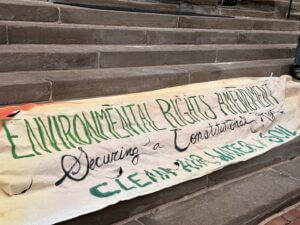Environmental Rights for Connecticut — Now and in the Years to Come

May 8, 2024
By Dr. Kimberly Stoner, CT NOFA Director of Advocacy
A recent newspaper column attacked the CT Environmental Rights Amendment by saying “[the] Environmental Rights Amendment could justify almost anything.” The columnist is correct in saying that we don’t know what all the consequences would be of putting the fundamental human right to a clean and healthy environment into our state constitution. However, we, the people of Connecticut, depend on a clean environment for our health and survival, so protecting our environmental rights would improve our lives and health.
Once the people of Connecticut get an opportunity to stand up for their rights in a referendum and vote the CT Environmental Rights Amendment into our state constitution, those rights will likely remain in our state constitution for decades, as they have in Pennsylvania and Montana. We don’t know what threats to our health and survival will be coming in future decades, but we know that fundamental rights, like freedom of speech or freedom of religion, remain valid and provide essential protections as new and different threats arise.
When Pennsylvania put a similar amendment into their state constitution in the early 1970s, the people of Pennsylvania didn’t know that a technique of extracting oil and gas called “fracking” would be invented and would be poisoning their air and water, 40 years later. They didn’t know that the legislature of Pennsylvania, under the influence of the fracking industry, would pass a law overruling local zoning that would allow fracking in every zoning district, including residential districts and near schools, playgrounds, and hospitals. In addition, under this law, communities had to allow seismic testing, including the use of explosives, in all zoning districts. Because they had a strong declaration of environmental rights in their state constitution, recognizing the fundamental human right to clean air and pure water, they were able to get that law overturned by the state court as unconstitutional.
The columnist also argued that there are many specific actions the CT General Assembly could take to improve our environment. The CT Environmental Rights Amendment would not prevent our legislators from taking those specific actions, but it would shift power to the people to advocate for prevention of environmental damage. As Director of Advocacy for CT NOFA, I have been working hard to advocate for specific bills in the CT General Assembly this session that would stop the chemicals PFAS from being used in consumer goods and applied to our soil, further limit the use of neonicotinoid insecticides and highly toxic and persistent 2nd generation rodenticides, and speed up the transition from fossil fuels by expanding generation of solar energy. All these efforts could be strengthened by an Environmental Rights Amendment.
The Connecticut Environmental Rights Amendment will reinforce the environmental laws we have and will require the state government to consider our fundamental human right to a healthy environment in everything they do. Some consider that to be a bad thing; I consider it to be a very good thing.
Recent Posts
Bulk Order NOFA Membership Discounts
The Bulk Order, in its previous format, is no longer taking place. The legacy of the Bulk Order continues – not as a one-time order event, but as an ongoing member benefit that supports growers, and grows over time as we add more vendors and wholesale-level access.
For 2026, we are connecting members to quality organic growing supplies with a direct-to-consumer purchasing option through our program partners: Progressive Grower and Fedco Seeds.
Read MoreTown Halls Across Connecticut Rally Support for Environmental Rights Amendment
Representatives Matt Blumenthal and Gregory Haddad, Senator Mae Flexer, Community Members, and Activists Call for the state legislature to pass an Environmental Rights Amendment during the 2026 Legislative Session
Read More

